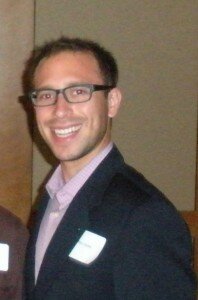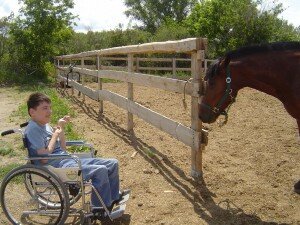A Returned Peace Corps Volunteer’s Story, Part 4
 Today’s blog post comes from Perry Teicher, a Returned Peace Corps Volunteer who served in Kazakhstan from 2007-2009. This is the fourth of five posts about his Peace Corps service. Be sure to read the first, second and third posts.
Today’s blog post comes from Perry Teicher, a Returned Peace Corps Volunteer who served in Kazakhstan from 2007-2009. This is the fourth of five posts about his Peace Corps service. Be sure to read the first, second and third posts.
Kazakhstan has an incredibly high incidence rate of Cerebral Palsy. According to the Kazakhstan Ministry of Health, over 10,000 children in the country have this disease. Many factors may have led to this situation, including poor nutrition habits, Soviet nuclear testing, and a deteriorating and often corrupt healthcare system. As a result, the “Society for the Protection of Paralyzed Citizens of Aktobe” worked extensively with this group and their parents, as well as children and young adults with other types of physical and psychological disabilities.
For the past few years, the organization supported these kids and their families primarily by throwing holiday parties and giving gifts. Working with the Volunteer Club: DAR, we re-imagined what more could be done to support this group. Kazakhs are traditionally a nomadic people and have a very strong connection with horses. Having heard of the benefits of hippotherapy, we decided to pursue this tack.
 Starting with one participant – Yan – over 10 children eventually participated in our riding program. Over the course of the months, parents started noticing changes in their children; ranging from becoming more outgoing to better posture. In addition to the parents and riders, our volunteer played a role, learning how to work with horses and learning basic therapeutic techniques.
Starting with one participant – Yan – over 10 children eventually participated in our riding program. Over the course of the months, parents started noticing changes in their children; ranging from becoming more outgoing to better posture. In addition to the parents and riders, our volunteer played a role, learning how to work with horses and learning basic therapeutic techniques.
Unfortunately, due to the Kazakhstani weather and funding issues, the program is temporarily on hiatus, but I hope that with Spring and new energy, riding will pick up again and more children and their parents will be smiling soon.
A program that is still running and continuing to show benefits is the English Club, in Aktobe, Kazakhstan. It demonstrates that good students strive for knowledge and to teach and learn from others. A few years ago, Peace Corps Volunteers started an Aktobe English Club. The Volunteers left and the English Club remained. Former students started to organize the weekly meetings. When my group of Peace Corps Volunteers arrived, we were immediately accepted into the club, starting with an Academic Quiz Bowl during our first day in the city. Through today, a Kazakhstani student and Peace Corps Volunteer teamed up to plan each week’s events – including themed, interactive lessons, movie clubs, academic marathons, and speakers.
As I traveled throughout the rest of Kazakhstan, Central Asia, and the Caucuses, the breadth of English Clubs simply amazed me. In rural mountain towns connected only by dirt roads to urban centers of totalitarian countries, students organized opportunities to come together, learn, and speak English. Even more interesting is the use of these clubs as a method of promoting critical thinking skills. While the formal educational systems in many of these countries promotes rote learning, these self-taught clubs challenged students to analyze and thinking creatively.
In Aktobe, Damesh, a second-year university student at the time, started coming to the English Club as a participant. She spoke excellent English but was a little shy, with no apparent interest in standing in front of the group. Within a few weeks, Damesh started to lead English Clubs. Then, she began to volunteer with the local organization focused on creating an environment where people with disabilities could lead independent lives. Three years later, she is enrolled in a Master’s program at a major university in the capital, teaching undergraduate students, and a regular source of inspiration for aspiring volunteers.
Perry Teicher is the Repair the World Fellow, 2010-2011. He served in Peace Corps Kazakhstan (2007-2009). Feel free to e-mail him at .


